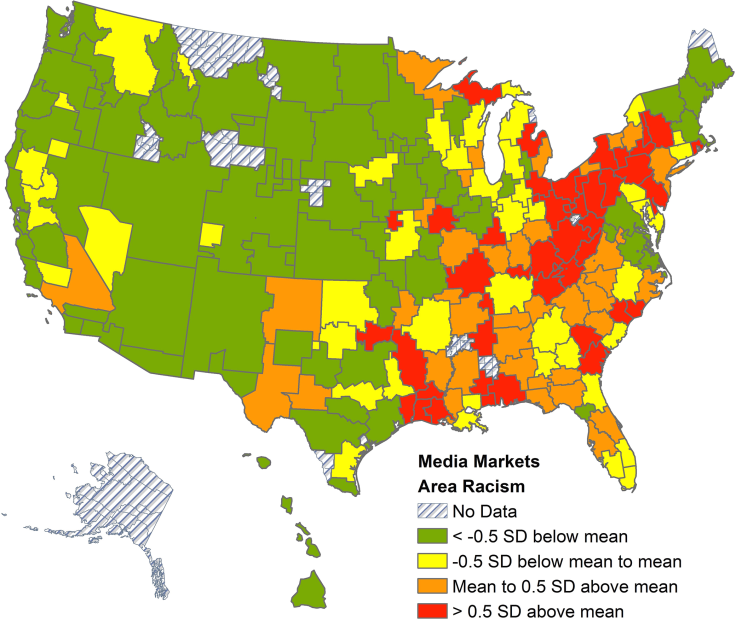Google Maps Reveal Racist Searches Associated With Increased Rates Of Black Deaths

Though we often think of racism as an overt hostile force that can't help but express itself loudly from the mouths of dastardly evil people, social scientists have long known about the subtler influences discrimination can wreak on a population. Whether it's longer waiting times in the emergency room, unequal treatment of minority homeowners applying for mortage loans, or more rejected job applications for those with "blacker" names than those white, racism is far from over. But the relative ubiquity and silence of these prejudices can make it difficult to understand just how far reaching their effects are on those who most suffer from them. Now, the authors of a PLOS ONE study claim they've created a road map of the country's innermost racial biases via Google search. And using that map, they further found that where racism looms largest, the more black people die.
Measuring and comparing the proportion of Google searches containing the "N-word" across different designated market areas (DMAs), a region of the country that receives similar media programming, the University of Maryland researchers hoped to graph the level of racism in any one geographical area (excluding less populated parts of the country like Alaska). According to the study, these Internet-based measures can capture socially unacceptable attitudes and actions in a way that previous efforts, using self-reported surveys or broader looks at racial segregation and isolation, might not be able to otherwise.
Though the researchers conceded the possibility of people innocuously using the "N word" in their Google searches, they felt that these queries would pale in comparison to those made with less noble intentions. In fact, they specifically chose to exclude searches containing the "N word" that ended with -a or -as, aware of the differences in context between the two words. It's also not the first time that scientists have mined the Internet for insights into our collective psyche. "Studies have found that Internet searches on other subjects, including religiosity and firearms, reflect socio-demographic characteristics of the underlying population," the authors wrote.
Overlying their map onto the mortality rates of black people from 2004 to 2009, using data from the National Center for Health Statistics, the researchers found a strong association between the levels of racism found in an area to increased rates of mortality among blacks 25 years old and older. DMAs whose racism was judged a standard deviation above the average were associated with an eight percent increase in the all-cause black mortality rate, or over 30,000 more deaths annually. This association, though weaker, remained even after controlling for factors in education, wealth, and white mortality rates, among others, and was especially pronounced with higher rates of heart disease and cancer.
Though the study cannot definitively pinpoint the cause or direction of their results, the authors note that previous research has observed stark disparities across racial lines in health care affordability and access to proper food, exercise, and shelter, and that these disparities can, at least in part, be attributed to an ongoing legacy of racially influenced biases within our culture. "Discrimination is more insidious today. Racism in major societal domains, such as in housing, employment, and criminal justice contexts continues despite the existence of protective legislation," lead author Dr. David H. Chae said in a press release.
Whatever their origins, shouldering those extra burdens can shorten life expectancy, the authors say. A conclusion bolstered by the study's finding was that no matter where the DMA was located, the mortality rate was higher among blacks than whites. They also explain that experiencing personal discrimination itself has been shown to cause stress and anxiety, and that prolonged exposure to perceived racism can possibly even accelerate aging at the celluar level.
Chae's study is timely considering the nearby ongoing protests in Baltimore over the death of Freddie Grey, a 25-year-old African-American who died of a spinal injury while in police custody earlier this April. It's an incident that, among many others, activists and community leaders say showcases the way blacks are treated differently by the criminal justice system. These protests have called for an honest accounting of the racism and discrimination still present within our communities. Perhaps studies such as this can highlight the very real costs those marginalized continue to pay.
Source: Chae D, Clouston S, Hatzenbuehler M, et al. Association between an Internet-Based Measure of Area Racism and Black Mortality. PLOS ONE. 2015.



























